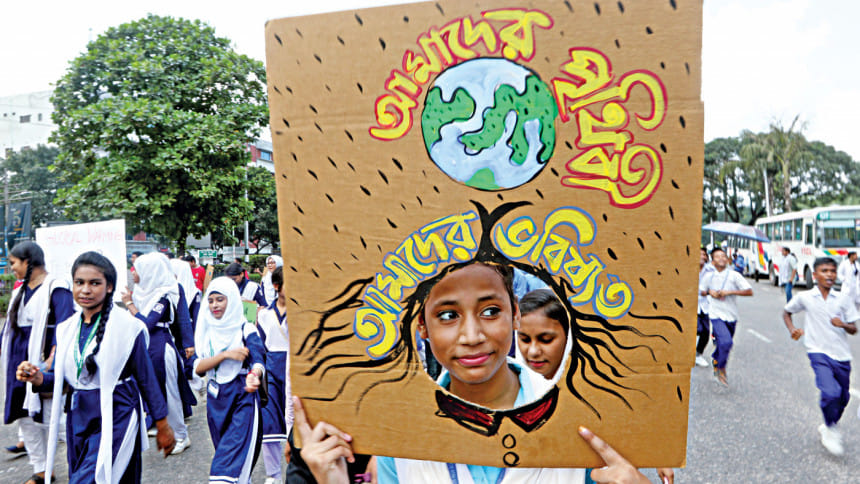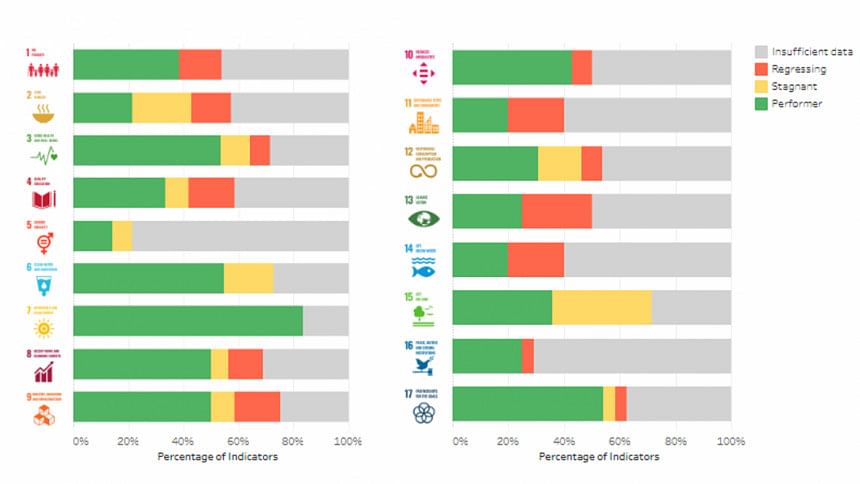Pathways and opportunities for accelerating Agenda 2030 and SDG achievement in Bangladesh

As we reach the halfway point since the Agenda 2030 and its Sustainable Development Goals (SDGs) were unanimously adopted in 2015 by 193 countries at the UN General Assembly, sadly, only 15 per cent of the targets are on track, and many, according to the UN Secretary-General, are going in reverse.[1] If that is the status worldwide, the situation for the Asia-Pacific region is similarly concerning. The 2023 SDG Progress Report by the UN Economic and Social Commission for Asia and the Pacific (UN ESCAP) reveals that the region has achieved only 14 per cent progress towards the goals, and at the current pace, it would take another 42 years to achieve the SDGs in the region.[2]
From some perspectives, the SDG progress in Bangladesh is not that grim. The UN ESCAP SDG Gateway highlights that the country has demonstrated notable performance in 31 per cent of all 248 indicators. A much better performing rate, if compared to the averages in the region and the world. Furthermore, Bangladesh is mentioned as one of the countries making better progress than the regional average on SDG 7 on Affordable and Clean Energy, and SDG 4 on Quality of Education. However, there is still much to do, as 11 per cent of the indicators are stagnant, 14 per cent of them are regressing, and there is insufficient data to assess progress on the remaining 44 per cent.
Figure 1. Bangladesh status for SDG indicators

Source: National SDG Profiles | SDG Data Gateway (unescap.org)
[1] Secretary-General's remarks to the High-Level Political Forum on Sustainable Development https://www.un.org/sg/en/content/sg/speeches/2023-09-18/secretary-generals-remarks-the-high-level-political-forum-sustainable-development
[2] SDG Progress Report 2023 | SDG Data Gateway (unescap.org)
A halfway balance for Bangladesh: the good, the bad and the missing
It could be the case that the UN ESCAP database is not up-to-date or that not all indicators are reported in line with official sources. Therefore, it is important to verify the official reporting mechanism established by the government.
The most important official reporting mechanism is the Voluntary National Review (VNR), where countries present at the High-Level Political Forum organized every year at the UN Headquarters in New York. Bangladesh has so far presented two VNRs, the first in 2017 and the second in 2020, and is already on the list of countries to present a VNR in 2025, demonstrating its firm commitment to the SDG agenda.
In the most recent VNR, Bangladesh highlighted progress in several key areas. This included notable reductions in poverty (SDG 1) and hunger (SDG 2), a decline in neonatal and under 5 mortality rates (SDG 3), achieving gender parity in primary and secondary education (SDG 4), and expanding access to electricity at 96 per cent (SDG 7). In addition, there has been an increase in the annual growth rate of real GDP per employed person (SDG 8), a rise in the share of GDP of manufacture (SDG 9), and an increase in budget allocations for social protection (SDG 10).
Additionally, Bangladesh has undertaken a number of initiatives, including the SDG Action Plan, the launch of the SDG Tracker webpage, the development of an SDG Financing Strategy. the collaboration framework between the Government and UN agencies, the adoption of 39+1 priority targets for localizing the SDGs, the establishment of two committees for data coordination and subnational implementation, and the integration of SDGs in the school curriculum and official training programs for government officials.
However, it is hard to assess progress on the SDGs based on the official reporting mechanisms. For example, the SDG Tracker[1] webpage reports progress in only 8 out of the 39 targets adopted as national priorities. On the other hand, 4 of the 39 targets adopted as national priorities are off track, namely, increase in female labor participation rate to 50 per cent, the increase in annual GDP growth to 10 per cent, the reduction of unemployment rate below 3 per cent, and the increase in the share of manufacturing employment to 25 per cent.
Moreover, with respect to 27 of the 39 priority targets, 69 per cent of them, it is not possible to assess progress as there is no data for 15 of these targets, or the available data is only for the baseline year for 12 targets. Essentially, all environmental targets fall here. Other than target 32, which refers to reduction of deaths due to natural disasters, and is on track, all other environment-related targets such as protected natural areas, forests, waste management, and even water, sanitation or public transportation, have no data or only the baseline is available.
Time to do more, but mostly it is time to do better
While there is still time to get back on track on several targets, it is clear Bangladesh needs to double down its efforts on a few fronts. To start with, there is a clear urgent need to strengthen up-to-date and periodic data generation. It will be hard to allocate resources, prioritize, design evidence-based policies and establish partnerships without reliable data analytics.
On the other hand, it will be important to think strategically on what targets should be prioritized. As it is a colossal task to achieve the SDGs, or even achieve as many goals and targets as possible in the remaining time, focusing on those targets that have a multiplier effect, considering the interlinkages between them, will be instrumental.
The United Nations Development Programme's (UNDP's) Integrated SDG Insights report produced in 2023 provides insights on this for more than 90 countries, including Bangladesh.[1] Leveraging Artificial Intelligence, these reports consider national priorities and local contexts, alongside empirical evidence from around the world to establish synergies and trade-offs between various targets. The Insights reports help to identify the potential targets to be used as departure points for policy pathways. In the case of Bangladesh, the Integrated SDG Insights report identified the following four SDG targets:
Target 1.1: Eradicate extreme poverty
Target 8.1: Sustainable economic growth
Target 8.5: Full employment and decent work with equal pay
Target 10.1: Reduce income inequalities
Building upon the achievements already made on poverty reduction and successful public programs like the "Skills for Employment Investment Programme" and the "Employment Generation Programme for the Poorest," the report recommends further investment in income-generation activities of the poor, as well as tackling multidimensional deprivations and vulnerabilities. These investments could create positive synergies and multiplier effects on other SDGs, including those related to health, water and sanitation, productivity through education, entrepreneurship, and overall economic growth.
Concurrently, it is important to consider potential trade-offs and mitigation measures, as these interventions can strain water resources increase pressure on water conservation and degrade natural habitats and biodiversity. Thus, according to the Integrated SDG Insights report for Bangladesh, poverty-eradication policies should also promote responsible use of natural resources and develop biodiversity-resilient sustainable urbanization.
Economic growth in Bangladesh, on the other hand, has helped improve a number of socioeconomic indicators and contributed to macroeconomic stability in general. Maintaining this pace will help to further achieve goals like poverty eradication, better health outcomes, energy efficiency, infrastructure and technological innovation.
[4] Bangladesh - BGD (undp.org)
However, the trade-offs of economic growth include pollution-related deaths and illnesses due to hazardous chemicals and biproducts, and environmental damage to air, water and soil, water ecosystems, gravely impacting SDGs. Thus, it is crucial for policies emphasizing green growth, circular economy, climate resilient and disaster loss recovery, as well as sustainable housing, to be emphasized among the economic growth measures.
In terms of decent work, further efforts should be made to reduce informality, promote productive employment for the youth, and close the digital divide between rich and poor, urban and rural areas and, perhaps more importantly, between men and women. While female labor participation rate has increased from 36 per cent in to 43 per cent, it is still below the 50 per cent target set in the national priorities. Furthermore, the fact that many women are employed in the informal sector, many of them the RMG industry, raises some concerns on the quality of employment.
Addressing the lagging women's employment rate requires tacking barriers like child marriage, women's safety and security and gender-centric social norms. Decent employment has positive synergies on several other SDGs, including health, gender equality, water and sanitation, and international cooperation and access to science, technology, and innovation.
One of the unintended consequences of accelerated economic growth in Bangladesh has been the increase in income inequality. The Gini coefficient, a well-known measure of income inequality, has been increasing from 0.458 in 2010 to 0.482 in 2016, and more recently to 0.499 in 2022. SDG target 10.1 aims to close the income inequality gap by promoting pro-poor inclusive growth, particularly for the bottom 40 per cent at a higher rate than the national average. The Integrated SDG Insights report suggests more targeted interventions are needed, as well as programmes for job creation, climate change adaptation, and to expand the social protection system.
One additional critical point on the means of implementation, involves addressing the long-standing challenge of increasing domestic revenue. Bangladesh's domestic revenue is well below the average of Low Income Developing Countries, leading to reliance on public debt, including to finance development plans. An Integrated National Financing Framework (INFF), which has been developed in many countries including Bangladesh with support from the UN, can be a powerful tool to consolidate and strengthen the financing of the development architecture in the country.
Amongst other things, to face the fiscal and financing development challenges, the INFF can strengthen the financial architecture, help expedite tax and tariff reforms, improve public finance governance mechanisms, combat illicit financial flows, strengthen debt sustainability, and align the national budget to the SDGs. While achieving the SDGs is a shared responsibility with the private sector, international cooperation, civil society, and other actors, governments, and the way governments finance development, play a fundamental role in its success.
The next big lift: from commitments to actions
There is no doubt of Bangladesh's commitment to Agenda 2030 and the SDGs. This was reinforced during the SDG Summit held in September 2023, with national commitments to SDG transformation in: 1) social protection and jobs, 2) essential services and transforming education, 3) energy for all and shift to renewables, 4) securing food, water and sanitation systems, 5) digital transformation, 6) protecting biodiversity and nature, 7) gender equality, and 8) disaster risk reduction. The country also committed to improve the institutional arrangements for a) data ecosystems for monitoring and reporting, b) public sector capabilities for implementation, c) financing needs and mechanisms, and d) awareness raising and localization plans.[2]
The level of ambition of these SDG commitments aligns with the goals to reach Upper Middle-Income country (UMIC) status by 2031, and developed country status by 2041. However, key intermediate milestones include a smooth transition from Least Developed Country (LDC) status, set for November 2026, with multiple concessions and other preferential treatments phasing out.
To successfully achieve LDC graduation by 2026 and SDG achievement by 2030, and reach UMIC status by 2031, Bangladesh will have to move from commitments to accelerated actions, policies and interventions, financing, alongside the necessary reforms. There is no time to waste. Business as usual will not produce the much-needed results to meet these ambitions.
The government formed following the January 7 elections, has a new opportunity to reshape and refine the development course Bangladesh. Bangladesh and its partners should therefore press ahead with new impetus to accelerate reforms that will help the country advance Agenda 2030 and its SDGs, accelerate sustainable development to ensure progress and prosperity for all.
The SDGs have the potential to be the means and the motivation. As the UN Secretary General Antonio Guterres emphasized, "The "SDGs, "aren't just a list of goals. They carry the hopes, dreams, rights and expectations of people everywhere." The United Nations Development Programme (UNDP), together with Bangladesh bilateral and multilateral partners, stands ready to support Bangladesh for the next big lift.
[5] SDG National Commitments Form Submissions | Sustainable Development (un.org)

 For all latest news, follow The Daily Star's Google News channel.
For all latest news, follow The Daily Star's Google News channel. 



Comments